2023届高考英语二轮语法复习三大从句连词课件(共45张PPT)
文档属性
| 名称 | 2023届高考英语二轮语法复习三大从句连词课件(共45张PPT) |  | |
| 格式 | zip | ||
| 文件大小 | 4.5MB | ||
| 资源类型 | 教案 | ||
| 版本资源 | 通用版 | ||
| 科目 | 英语 | ||
| 更新时间 | 2022-12-17 18:09:23 | ||
图片预览

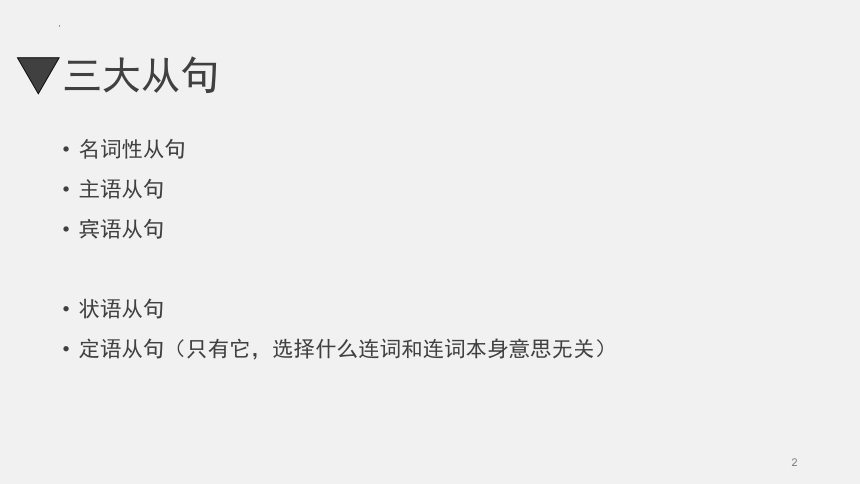
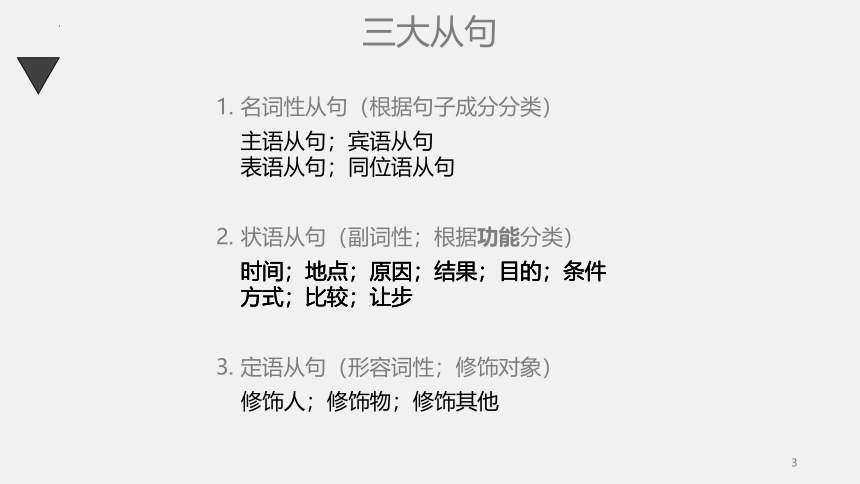
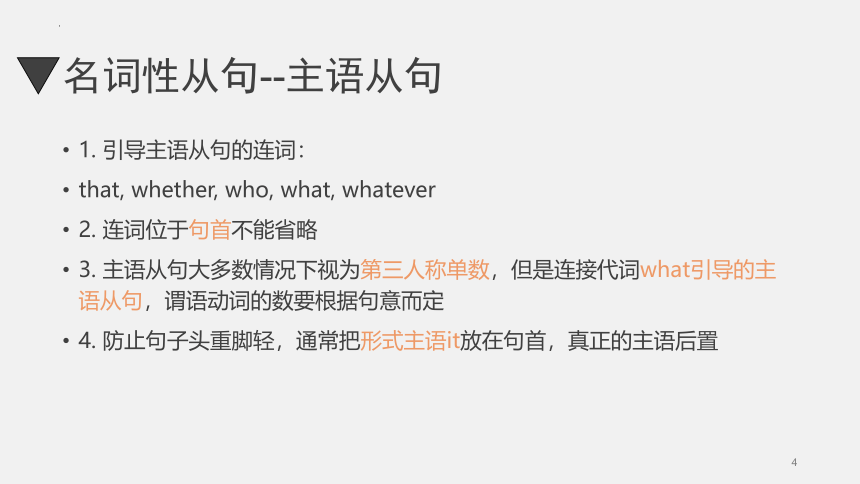
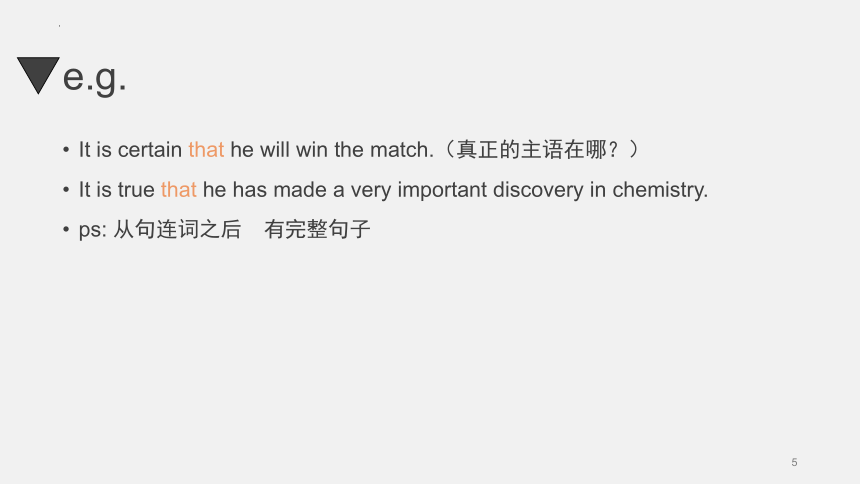
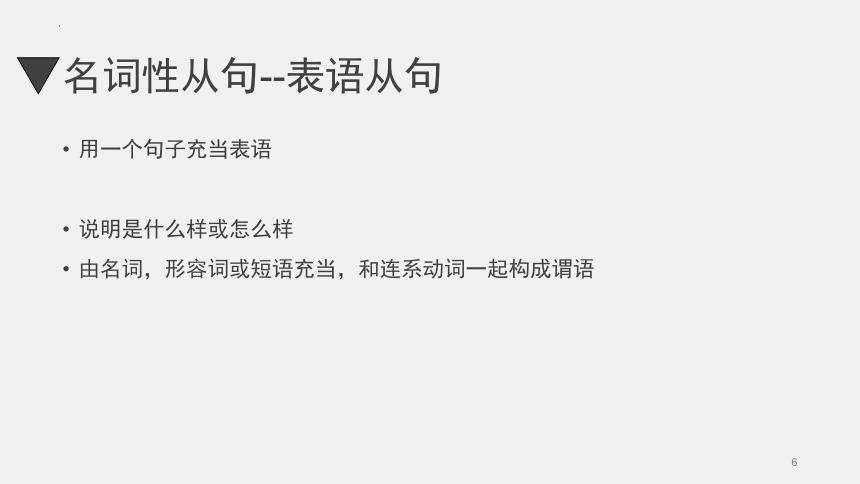
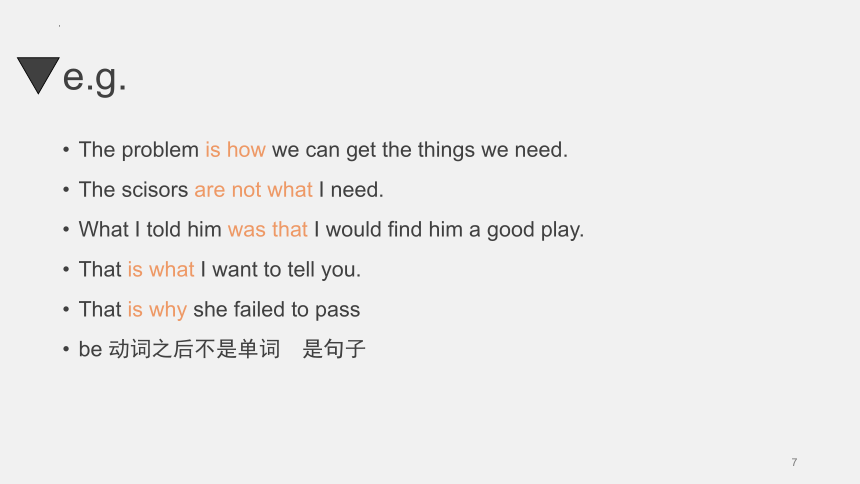
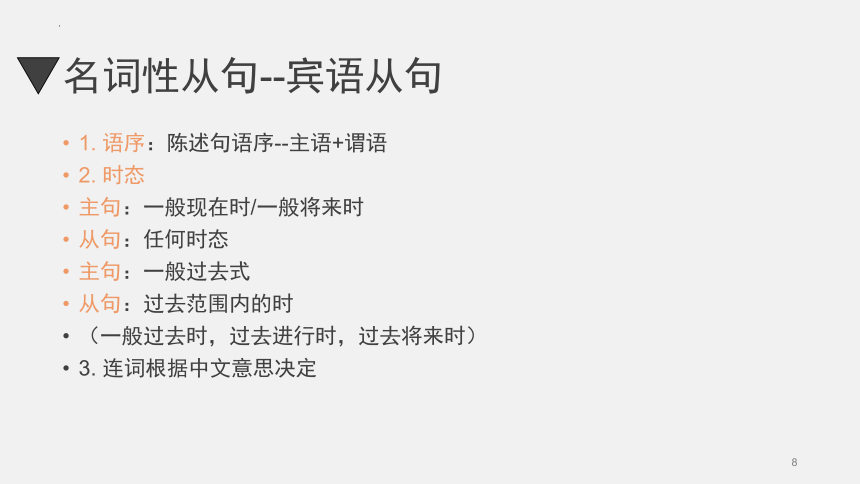
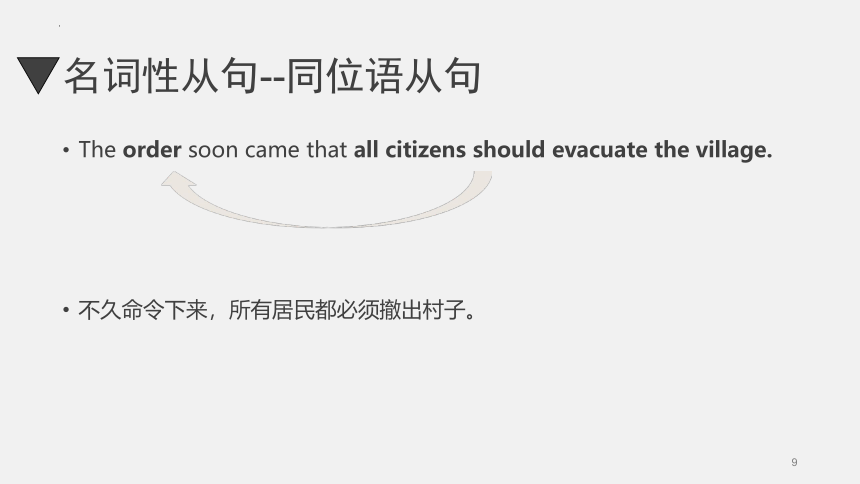
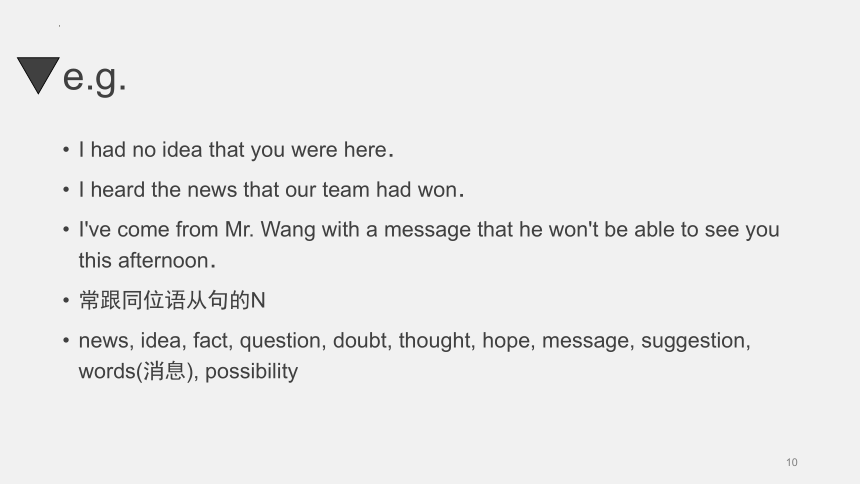

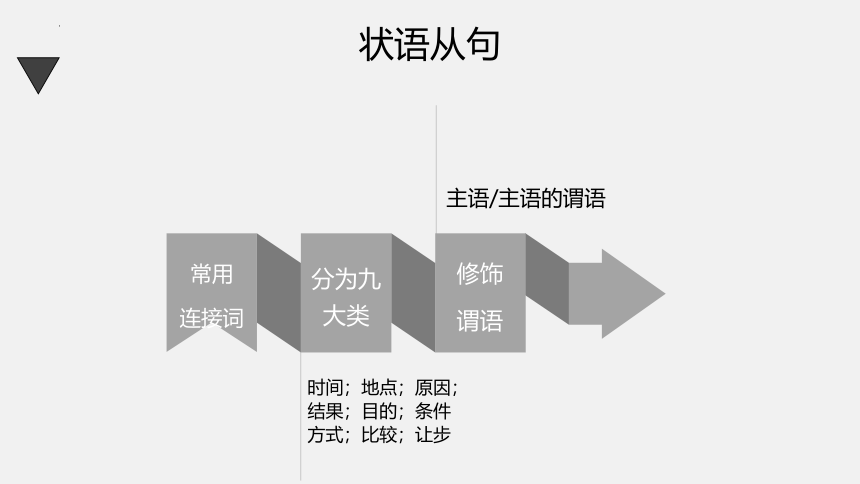
文档简介
(共45张PPT)
连词
三大从句
三大从句名词性从句主语从句宾语从句状语从句定语从句(只有它,选择什么连词和连词本身意思无关)三大从句1.名词性从句(根据句子成分分类)主语从句;宾语从句表语从句;同位语从句2.状语从句(副词性;根据功能分类)时间;地点;原因;结果;目的;条件方式;比较;让步3.定语从句(形容词性;修饰对象)修饰人;修饰物;修饰其他时间;地点;原因;结果;目的;条件方式;比较;让步时间;地点;原因;结果;目的;条件方式;比较;让步名词性从句--主语从句1.引导主语从句的连词:that, whether, who, what, whatever2.连词位于句首不能省略3.主语从句大多数情况下视为第三人称单数,但是连接代词what引导的主语从句,谓语动词的数要根据句意而定4.防止句子头重脚轻,通常把形式主语it放在句首,真正的主语后置e.g.It is certainthathe will win the match.(真正的主语在哪?)It is truethathe has made a very important discovery in chemistry.ps:从句连词之后 有完整句子名词性从句--表语从句用一个句子充当表语说明是什么样或怎么样由名词,形容词或短语充当,和连系动词一起构成谓语e.g.The problemis howwe can get the things we need.The scisorsare not whatI need.What I told himwas thatI would find him a good play.Thatis whatI want to tell you.Thatis whyshe failed to passbe动词之后不是单词 是句子名词性从句--宾语从句1.语序:陈述句语序--主语+谓语2.时态主句:一般现在时/一般将来时从句:任何时态主句:一般过去式从句:过去范围内的时(一般过去时,过去进行时,过去将来时)3.连词根据中文意思决定名词性从句--同位语从句Theordersoon came thatall citizens should evacuate the village.不久命令下来,所有居民都必须撤出村子。e.g.I had no idea that you were here.I heard the news that our team had won.I've come from Mr. Wang with a message that he won't be able to see you this afternoon.常跟同位语从句的Nnews, idea, fact, question, doubt, thought, hope, message, suggestion, words(消息), possibility从句状语
主语/主语的谓语
时间;地点;原因;结果;目的;条件
方式;比较;让步
常用
连接词
修饰
谓语
状语从句
分为九大类
时间状语从句常用引导词:when, as, while, as soon as, after, before特殊引导词:the minute, the monment, the second, every time, the day,the instant, immediately , directly, no sooner … than, hardly …when, scarcely … whene.g.I will call youas soon asI arrive in Beijing.I didn'trealize how special my mother wasuntilI became an adult.WhileJohn was watching TV, his wife was cooking.The children ran away from the orchard(果园),the momentthey saw the guard.No soonerhad I arrived homethanit began to rain.Every timeI listen to your advice, I get into trouble.地点状语从句常用引导词:where特殊引导词:wherever, anywhere, everywhereGenerally, air will be heavily polluted where there are factories.Wherever you go, you should work hard.原因状语从句常用引导词:because, since, as, for特殊引导词:seeing that, now that,in that, considering that, given that.My friends dislike me because I'm handsome and successful.Now that everybody has come, let's begin our conference.The higher income tax is harmful in that it may discourage people from trying to earn more.目的状语从句常用引导词:so that, in order that特殊引导词:lest, in case, for fear that,in the hope that, for the purpose that, to the end thatThe boss asked the secretary to hurry up with the letters so that he could sign them.The teacher raised his voice on purpose that the students in the back could hear more clearly.结果状语从句常用引导词:so, so … that, such … that,特殊引导词:such that, to the degree that, to the extent that, to such a degree thatHe got up so early that he caught the first bus. It's such a good chance that we must not miss it.To such a degree was he excited that he couldn't sleep last night.条件状语从句常用引导词:if, unless,特殊引导词:as/so long as, only if, providing/provided that, supposing that, in case that, on condition thatWe’ll start our project if the president agrees.You will certainly succeed so long as you keep on trying.Provided that there is no opposition, we shall hold the meeting here.让步状语从句常用引导词:though, although, even if, even though特殊引导词:as(用在让步状语从句中必须要倒装),while (一般用在句首),no matter…,in spite of the fact that, while, whatever, whoever, wherever, whenever, however, whicheverMuch as I respect him, I can’t agree to his proposal.The old man always enjoys swimming even though the weather is rough.No matter how hard he tried, she could not change her mind.He won’t listen whatever you may say.比较状语从句常用引导词:as(同级比较),than(不同程度的比较)特殊引导词:the more…the more…just as…,so…; A is to B what /as X is to Y; no…more than; not A so much as BShe is as bad-tempered as her mother.The house is three times as big as ours.The more you exercise, the healthier you will be.Food to men is what oil is to machine.方式状语从句常用引导词:as, as if, how特殊引导词:the wayWhen in Rome, do as the Roman do.She behaved as if she were the boss.Sometimes we teach our children the way our parents have taught us.从句定语定语从句修饰人who, whose, whom, that修饰物which, that修饰其他时间when(...day when... ; when... , I ...)地点where原因why定语从句修饰 名词或代词的 从句先行词:被定语从句修饰的词关系词:引导定语从句的词关系词的3个作用:引导定语从句代替先行词在定语从句中 充当 一个成分e.g.The man who is shaking hands with my friends is a policeman.who is shaking hands with my friends是定语从句修饰先行词the man“who”是引导定语从句的关系词,代替先行词the man,在定语从句中作主语。如何改成 非谓语?1.who指人,在定语从句中作主语。The boyswhoare playing football are from Class One.Thosewhowant to go to the museum must be at the school gate at 7 tomorrow morning.Yesterday I helped an old manwhohad lost his way.That is the teacherwhoteaches us physics.2.whom指人,在定语从句中做宾语,常可省略Mr Liu is the person( whom )you talked about on the bus.Li Ming is just the boy( whom )I want to see.The professor( whom )you are waiting for has come.The girl( whom )the teacher often praises is our monitor.注意:关系代词whom在口语或非正式文体中常可用who来代替,也可省略。The man( whom / who )you met just now is my old friend.3.Which指物 在定语从句中做主语或宾语做宾语时常可省略Football is a gamewhichis liked by most boys. The factorywhichmakes computers is far away from here. He likes to read bookswhichare written by foreign writers. The housewhichis by the lake looks nice. This is the pen( which )he bought yesterday. The film( which )they went to see last night was not interesting at all.4.That指人时,相当于who或whom指物时,相当于which在定语从句中作主语或宾语作宾语时常可省略。The number of peoplethat / whocome to visit this city each year reaches one million.Where is the manthat / whomI saw this morning The personthat /whomyou introduced to me is very kind. The seasonthat / whichcomes after spring is summer. Yesterday I received a letterthat / whichcame from Australia.5.Whose通常指人,也可指物,在定语从句中做定语I visited a scientistwhosename is known all over the country. He has a friendwhosefather is a doctor. I once lived in the housewhoseroof has fallen in.注意:指物时,常用下列结构来代替:The classroomwhosedoor is broken will soon be repaired.The classroom the doorof whichis broken will soon be repaired.Do you like the bookwhosecover is yellow Do you like the book the coverof whichis yellow “介词+关系代词”引导的定语从句关系代词在定语从句中作介词宾语时,从句常常由“介词+关系代词”引出。 The school(which / that)he once studiedinis very famous. The schoolin whichhe once studied is very famous. Tomorrow I'll bring here the magazine(which / that)you askedfor. Tomorrow I'll bring here the magazinefor whichyou asked.ps: in that含有介词的短语动词一般不拆开,介词仍放在短语动词的后面e.g.:look for, look after, take care of ...关系副词引导的定语从句when指时间,在定语从句中作时间状语。I still remember the daywhenI first came to this school. The timewhenwe got together finally arrived. October 1st, 1949 was the day when the People's Republic of China was founded. Do you remember the yearswhenhe lived in the countryside with his grandparents.where指地点,在定语从句中作地点状语Shanghai is the citywhereI was born. The housewhereI lived ten years ago has been pulled down. I visited the farmwherea lot of cows were raised . Is this the placewherethey fought the enemy why指原因,在定语从句中作原因状语Please tell me the reasonwhyyou missed the plane. The reasonwhyhe was punished is unknown to us. I don’t know the reasonwhyhe looks unhappy today.注意:关系副词引导的定语从句经常可以用“介词+关系代词”引导的定语从句来表示。如:From the yearswhen / in whichhe was going to primary school in the country he had known what he wanted to be when he grew up.(go to primary schoolinthe years)Great changes are taking place in the citywhere / in whichthey live. The reasonwhy / for whichhe refused the invitation is quite clear.限制性定语从句The teacher told methatTom was the only person that I could depend on.China is a countrywhichhas a long history.In the street I saw a manwhowas from Africa.关系词充当成分非限制性定语从句His mother, who loves him very much, is strict with him. China, which was founded in 1949, is becoming more and more powerful.专有名词 常出现专有名词Last summer I visited the People's Great Hall, in which many important meetings are held every year.限制性定语从句形式上:不用逗号“,”与主句隔开。意义上:是先行词不可缺少的定语,如删除,主句则失去意义或意思表达不完整。译法上:译成先行词的定语:“...的”关系词的使用上:A.作宾语时可省略B.可用that C.可用who代替whom非限制性定语从句 形式上:用逗号“,”与主句隔开。 意义上:只是对先行词的补充说明,如删除,主句仍能表达完整的意思。 译法上:通常译成主句的并列句。 关系词的使用上:A.不可省略B.不用that C.不可用who代替whom只能用that引导定从6种情况1.当先行词是everything, anything, nothing (something除外), all, none, few, little, some等不定代词时或当先行词受every, any, all, some, no, little, few, much等代词修饰时Have you taken downeverything thatMr. Li said There seems to benothing thatis impossible to him in the world. All thatcan be done has been done. There islittle thatI can do for you. 2.当先行词被序数词修饰时Thefirst placethatthey visited in London was the Big Ben.3.当先行词被形容词最高级修饰时This isthebestfilmthatI have ever seen.4.当先行词被the very, the only修饰时This is the very dictionarythatI want to buy.5.当先行词前面有who, which等疑问代词时
Who is the man that is standing by the gate
Which is the T-shirt that fits me most
6.当先行词为人与动物或人与物时
They talked about the persons and things that they remembered at school.
连词
三大从句
三大从句名词性从句主语从句宾语从句状语从句定语从句(只有它,选择什么连词和连词本身意思无关)三大从句1.名词性从句(根据句子成分分类)主语从句;宾语从句表语从句;同位语从句2.状语从句(副词性;根据功能分类)时间;地点;原因;结果;目的;条件方式;比较;让步3.定语从句(形容词性;修饰对象)修饰人;修饰物;修饰其他时间;地点;原因;结果;目的;条件方式;比较;让步时间;地点;原因;结果;目的;条件方式;比较;让步名词性从句--主语从句1.引导主语从句的连词:that, whether, who, what, whatever2.连词位于句首不能省略3.主语从句大多数情况下视为第三人称单数,但是连接代词what引导的主语从句,谓语动词的数要根据句意而定4.防止句子头重脚轻,通常把形式主语it放在句首,真正的主语后置e.g.It is certainthathe will win the match.(真正的主语在哪?)It is truethathe has made a very important discovery in chemistry.ps:从句连词之后 有完整句子名词性从句--表语从句用一个句子充当表语说明是什么样或怎么样由名词,形容词或短语充当,和连系动词一起构成谓语e.g.The problemis howwe can get the things we need.The scisorsare not whatI need.What I told himwas thatI would find him a good play.Thatis whatI want to tell you.Thatis whyshe failed to passbe动词之后不是单词 是句子名词性从句--宾语从句1.语序:陈述句语序--主语+谓语2.时态主句:一般现在时/一般将来时从句:任何时态主句:一般过去式从句:过去范围内的时(一般过去时,过去进行时,过去将来时)3.连词根据中文意思决定名词性从句--同位语从句Theordersoon came thatall citizens should evacuate the village.不久命令下来,所有居民都必须撤出村子。e.g.I had no idea that you were here.I heard the news that our team had won.I've come from Mr. Wang with a message that he won't be able to see you this afternoon.常跟同位语从句的Nnews, idea, fact, question, doubt, thought, hope, message, suggestion, words(消息), possibility从句状语
主语/主语的谓语
时间;地点;原因;结果;目的;条件
方式;比较;让步
常用
连接词
修饰
谓语
状语从句
分为九大类
时间状语从句常用引导词:when, as, while, as soon as, after, before特殊引导词:the minute, the monment, the second, every time, the day,the instant, immediately , directly, no sooner … than, hardly …when, scarcely … whene.g.I will call youas soon asI arrive in Beijing.I didn'trealize how special my mother wasuntilI became an adult.WhileJohn was watching TV, his wife was cooking.The children ran away from the orchard(果园),the momentthey saw the guard.No soonerhad I arrived homethanit began to rain.Every timeI listen to your advice, I get into trouble.地点状语从句常用引导词:where特殊引导词:wherever, anywhere, everywhereGenerally, air will be heavily polluted where there are factories.Wherever you go, you should work hard.原因状语从句常用引导词:because, since, as, for特殊引导词:seeing that, now that,in that, considering that, given that.My friends dislike me because I'm handsome and successful.Now that everybody has come, let's begin our conference.The higher income tax is harmful in that it may discourage people from trying to earn more.目的状语从句常用引导词:so that, in order that特殊引导词:lest, in case, for fear that,in the hope that, for the purpose that, to the end thatThe boss asked the secretary to hurry up with the letters so that he could sign them.The teacher raised his voice on purpose that the students in the back could hear more clearly.结果状语从句常用引导词:so, so … that, such … that,特殊引导词:such that, to the degree that, to the extent that, to such a degree thatHe got up so early that he caught the first bus. It's such a good chance that we must not miss it.To such a degree was he excited that he couldn't sleep last night.条件状语从句常用引导词:if, unless,特殊引导词:as/so long as, only if, providing/provided that, supposing that, in case that, on condition thatWe’ll start our project if the president agrees.You will certainly succeed so long as you keep on trying.Provided that there is no opposition, we shall hold the meeting here.让步状语从句常用引导词:though, although, even if, even though特殊引导词:as(用在让步状语从句中必须要倒装),while (一般用在句首),no matter…,in spite of the fact that, while, whatever, whoever, wherever, whenever, however, whicheverMuch as I respect him, I can’t agree to his proposal.The old man always enjoys swimming even though the weather is rough.No matter how hard he tried, she could not change her mind.He won’t listen whatever you may say.比较状语从句常用引导词:as(同级比较),than(不同程度的比较)特殊引导词:the more…the more…just as…,so…; A is to B what /as X is to Y; no…more than; not A so much as BShe is as bad-tempered as her mother.The house is three times as big as ours.The more you exercise, the healthier you will be.Food to men is what oil is to machine.方式状语从句常用引导词:as, as if, how特殊引导词:the wayWhen in Rome, do as the Roman do.She behaved as if she were the boss.Sometimes we teach our children the way our parents have taught us.从句定语定语从句修饰人who, whose, whom, that修饰物which, that修饰其他时间when(...day when... ; when... , I ...)地点where原因why定语从句修饰 名词或代词的 从句先行词:被定语从句修饰的词关系词:引导定语从句的词关系词的3个作用:引导定语从句代替先行词在定语从句中 充当 一个成分e.g.The man who is shaking hands with my friends is a policeman.who is shaking hands with my friends是定语从句修饰先行词the man“who”是引导定语从句的关系词,代替先行词the man,在定语从句中作主语。如何改成 非谓语?1.who指人,在定语从句中作主语。The boyswhoare playing football are from Class One.Thosewhowant to go to the museum must be at the school gate at 7 tomorrow morning.Yesterday I helped an old manwhohad lost his way.That is the teacherwhoteaches us physics.2.whom指人,在定语从句中做宾语,常可省略Mr Liu is the person( whom )you talked about on the bus.Li Ming is just the boy( whom )I want to see.The professor( whom )you are waiting for has come.The girl( whom )the teacher often praises is our monitor.注意:关系代词whom在口语或非正式文体中常可用who来代替,也可省略。The man( whom / who )you met just now is my old friend.3.Which指物 在定语从句中做主语或宾语做宾语时常可省略Football is a gamewhichis liked by most boys. The factorywhichmakes computers is far away from here. He likes to read bookswhichare written by foreign writers. The housewhichis by the lake looks nice. This is the pen( which )he bought yesterday. The film( which )they went to see last night was not interesting at all.4.That指人时,相当于who或whom指物时,相当于which在定语从句中作主语或宾语作宾语时常可省略。The number of peoplethat / whocome to visit this city each year reaches one million.Where is the manthat / whomI saw this morning The personthat /whomyou introduced to me is very kind. The seasonthat / whichcomes after spring is summer. Yesterday I received a letterthat / whichcame from Australia.5.Whose通常指人,也可指物,在定语从句中做定语I visited a scientistwhosename is known all over the country. He has a friendwhosefather is a doctor. I once lived in the housewhoseroof has fallen in.注意:指物时,常用下列结构来代替:The classroomwhosedoor is broken will soon be repaired.The classroom the doorof whichis broken will soon be repaired.Do you like the bookwhosecover is yellow Do you like the book the coverof whichis yellow “介词+关系代词”引导的定语从句关系代词在定语从句中作介词宾语时,从句常常由“介词+关系代词”引出。 The school(which / that)he once studiedinis very famous. The schoolin whichhe once studied is very famous. Tomorrow I'll bring here the magazine(which / that)you askedfor. Tomorrow I'll bring here the magazinefor whichyou asked.ps: in that含有介词的短语动词一般不拆开,介词仍放在短语动词的后面e.g.:look for, look after, take care of ...关系副词引导的定语从句when指时间,在定语从句中作时间状语。I still remember the daywhenI first came to this school. The timewhenwe got together finally arrived. October 1st, 1949 was the day when the People's Republic of China was founded. Do you remember the yearswhenhe lived in the countryside with his grandparents.where指地点,在定语从句中作地点状语Shanghai is the citywhereI was born. The housewhereI lived ten years ago has been pulled down. I visited the farmwherea lot of cows were raised . Is this the placewherethey fought the enemy why指原因,在定语从句中作原因状语Please tell me the reasonwhyyou missed the plane. The reasonwhyhe was punished is unknown to us. I don’t know the reasonwhyhe looks unhappy today.注意:关系副词引导的定语从句经常可以用“介词+关系代词”引导的定语从句来表示。如:From the yearswhen / in whichhe was going to primary school in the country he had known what he wanted to be when he grew up.(go to primary schoolinthe years)Great changes are taking place in the citywhere / in whichthey live. The reasonwhy / for whichhe refused the invitation is quite clear.限制性定语从句The teacher told methatTom was the only person that I could depend on.China is a countrywhichhas a long history.In the street I saw a manwhowas from Africa.关系词充当成分非限制性定语从句His mother, who loves him very much, is strict with him. China, which was founded in 1949, is becoming more and more powerful.专有名词 常出现专有名词Last summer I visited the People's Great Hall, in which many important meetings are held every year.限制性定语从句形式上:不用逗号“,”与主句隔开。意义上:是先行词不可缺少的定语,如删除,主句则失去意义或意思表达不完整。译法上:译成先行词的定语:“...的”关系词的使用上:A.作宾语时可省略B.可用that C.可用who代替whom非限制性定语从句 形式上:用逗号“,”与主句隔开。 意义上:只是对先行词的补充说明,如删除,主句仍能表达完整的意思。 译法上:通常译成主句的并列句。 关系词的使用上:A.不可省略B.不用that C.不可用who代替whom只能用that引导定从6种情况1.当先行词是everything, anything, nothing (something除外), all, none, few, little, some等不定代词时或当先行词受every, any, all, some, no, little, few, much等代词修饰时Have you taken downeverything thatMr. Li said There seems to benothing thatis impossible to him in the world. All thatcan be done has been done. There islittle thatI can do for you. 2.当先行词被序数词修饰时Thefirst placethatthey visited in London was the Big Ben.3.当先行词被形容词最高级修饰时This isthebestfilmthatI have ever seen.4.当先行词被the very, the only修饰时This is the very dictionarythatI want to buy.5.当先行词前面有who, which等疑问代词时
Who is the man that is standing by the gate
Which is the T-shirt that fits me most
6.当先行词为人与动物或人与物时
They talked about the persons and things that they remembered at school.
